Portrait of a Palate is a series of interviews exploring an individual’s relationship to food, how it’s shaped them, and how that relationship has evolved over the course of their lives.
Alia Ali is a translator, writer, recipe developer, and co-founder of the Malaysian food website Periuk. Based in Langkawi, Malaysia, she is driven by her curiosity for food, from fermentation and sustainable agriculture to the tactile joy of eating with chopsticks versus a fork. When she’s not delving into food, she might be thinking about swimming, the farmhouse aesthetic, or dreaming of year-round cold weather. Oh, and if you’re sending snacks, make it Cool Ranch Doritos or Jalapeño Cheddar Cheetos — her desert island picks (though the island she calls home is far from deserted).
Stay up to date with Alia’s latest work by subscribing to her newsletter at aliaali.com and follow her on Instagram @the_alia.
LINDSEY OTTO: How would you describe your relationship to food?
ALIA ALI: It’s always been a positive thing for me, and I know that that’s not true for a lot of people. I’m lucky I have that “all food is good” relationship.
Growing up, I didn’t have a great relationship with my mom but one thing that she never did was use food as punishment — the “you don’t get to eat dinner, go to bed” sort of thing. Food was never used as a punishment no matter how bad things got between us.
It was, however, used as a reward. I ate a wee bit too much instant noodles as a child so she would say, “You can have it once a week,” and it would be a trip to get it. Even into adulthood, when I think of treating myself, it’s always food. What treat do I want to get myself today if I finish something or if I simply just stay alive until the end of the day?
OTTO: Can you recall a specific meal or dish from your childhood that holds a special place in your memory?
ALI: There is a dish called kerabu kacang botol. I was 15 (I’m 39 now) and I still think about it very fondly. Dinners were always family style. Everyone had their own plate of rice and there were [many] dishes on the table. [Kerabu] is basically a raw or blanched vegetable, in this case a vegetable called four-angled or winged bean. It’s a very fun shape. It’s sliced thinly and you mix it with toasted coconut, sambal with shrimp paste, sliced shallots, a squeeze of lime, and it’s the best thing in the world.
I would eat until I had kerabu left, so I put more rice, but then I had more rice left so put more kerabu. It just went on and on like that. My brothers had gotten up and our help had already taken the dirty dishes off the table. It was just me at the giant dining table eating my fifth plate of just rice and kerabu kacang botol. That’s death row food for me. If I’m going to die tomorrow, that’s what I want to eat.
OTTO: How often would you eat it as a child?
ALI: It’s a lot of prep work, so likely once a month. As an adult, I eat it regularly.
The way I live now is what we call a forged family. We are five adults living together and we all have our roles to play. We’ve lived this way for about two years. It’s me, my very best friend, who I’ve been friends with for 20+ years, their spouse and a couple of other friends.
I’m the main cook. I’m learning now that it’s actually very hard to get three to four dishes on the table every single night. How did they do it? But that’s how I grew up, with that kind of variety. To get that variety now, I often go out to lunch at these mixed rice stalls, where they have rice and all sorts of curries and vegetables. They almost always have some sort of kerabu on it. I actually eat kerabu more often now, just not by my own hand. I love it so, so, so much.
OTTO: So you’re living communally? Would that be the right way to describe it?
ALI: Yes, I’m trying to reclaim the word “commune” because people hear the word and are like “oh you’re a hippie” or whatever. We all have been very good friends for decades, so it’s one of those things where you see headlines that may say, “Childhood friends build retirement village to live together.” Why wait until we retire? Let’s do it now.
OTTO: As the main cook, what is your kitchen like? How does it compare to what your kitchen was like as a child?
ALI: I’ve downsized my kitchen quite a bit. At one point I had three freezers running. I am not joking. I’m diagnosed with OCD, so I have a little bit of a hoarding tendency. One of the things I would hoard were spices, I would just jam them in the freezer. I would ask, “You want this? Yes, I’ve got it!” But I’ve tried my best to downsize.
My parents were both Malaysians. They’ve both passed. My dad had Indian ancestry in him, and my mom had Indonesian blood in her. That informed a lot of flavor profiles about what was served at the dinner table. We always had curries, but we also always had sambals. My dad was at Syracuse and Cornell in the 70s, and my brothers grew up there for a bit. They moved back here before I was born. All my brothers are older. My eldest brother is 14 years older than me.
As a child, I actually — surprise, surprise — picked up some of that hoarding tendency from my mom. When my parents moved back [to Malaysia], they brought back all of their stuff. My mom brought back all of her Corningware and Tupperware. She was a Tupperware sales lady and there was so much of that aesthetic in our kitchen. I still have a lot of Corningware because it’s just too pretty and it is kind of valuable, apparently. People collect them. So I’m just going to hang on to them until I feel like making an extra buck.
Because I grew up with three brothers and they were always hungry, there was always something on the table to eat, like fried rice, prawn fritter, or fish fritter to snack on. Every single day, there would be some kind of fried fish on the table — to the extent that instead of asking what's for dinner, my dad would ask what fish is for dinner. It would either be mackerel or small oily fish that you would dust with turmeric powder and salt and very simply fry.
We would have that on the table with anything else, like a spicy fish stew or whatever my mom was making. Dinners would be rice with a few dishes, like I said, or sometimes my mom would make a giant potato salad and my brother’s would go to town, you know?
It’s also not uncommon for Malaysians to have helpers, so we always had Indonesian helpers growing up and they would have sambals and that was really lovely. We always had food. My goal as the main cook now is to never let anyone in this household go hungry because I was never hungry growing up.
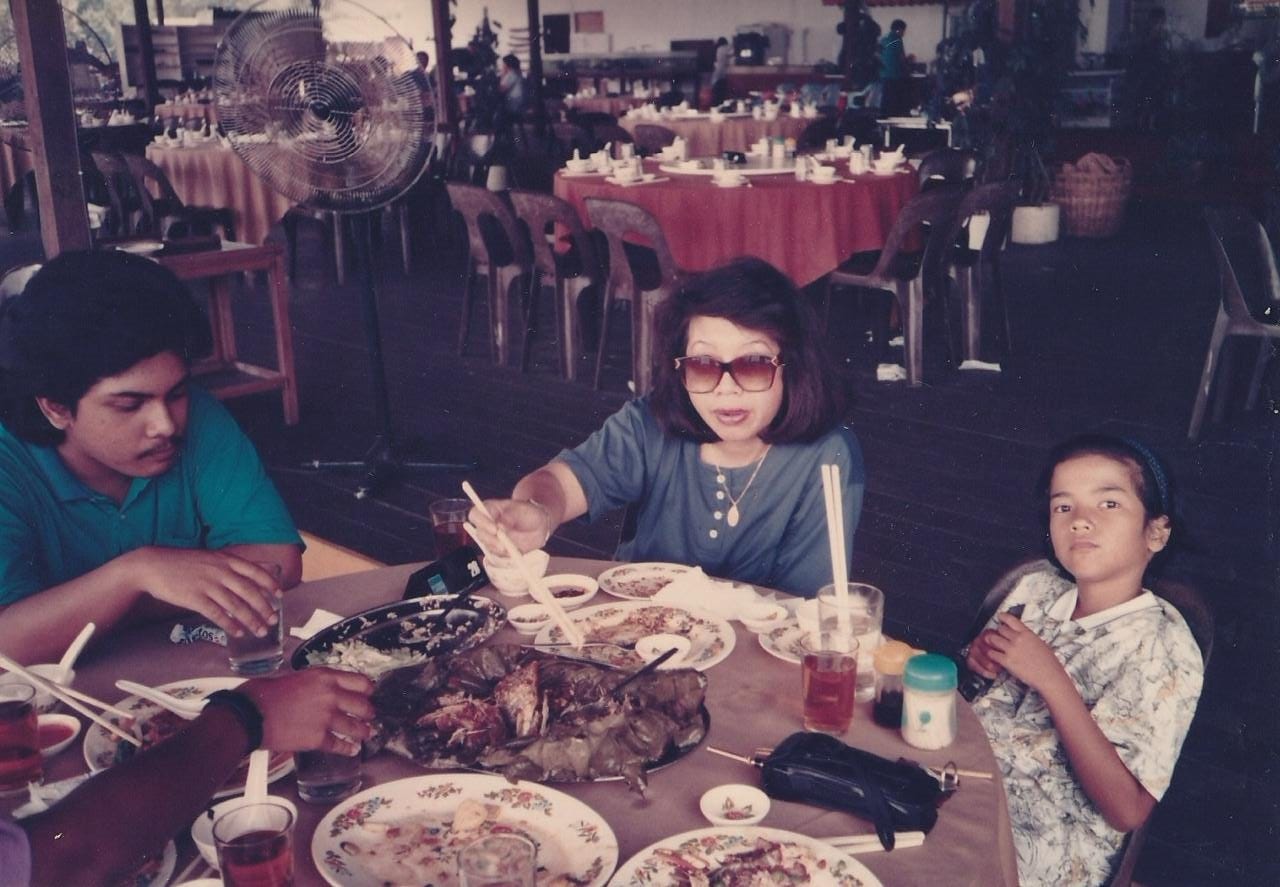
OTTO: What are your responsibilities as a main cook in your house?
ALI: I’m not a breakfast person. I don’t really eat breakfast nor am I awake for it. Someone else, who is very into breakfast, makes breakfast. Then, I’ll have lunch in town when I do errands and chores. I do most of the groceries and most of the dinner planning and execution.
Our house is a Venn diagram of neurodivergences — four of us have ADHD, two of us are severely depressed, some of us anxiety, and that’s just the mental health stuff. On the Venn diagram, one portion of people need to think about their cholesterol a bit more, one portion of people can’t take spicy food, one portion of people don’t like it when there are too many bones in something, so there’s a lot of fiddling around with that. It’s challenging but also fun.
As much as possible, I try to be aware of my energy levels and if I know I can’t make dinner that day, I’ll either take out something or ask someone else to cook. The great thing about living in Malaysia, or southeast Asia in general, is that eating out can be very affordable. On average, when I do a simple take out of some rice and noodles, it comes to just under $15 US dollars for all five of us. It’s very affordable to eat out, but we prefer to eat at home because it’s even cheaper and we all like cooking.
OTTO: What does your daily schedule usually look like, given your work and those household responsibilities?
ALI: Earlier in the year, I actually burnt out a little bit. A couple of friends in this household said to me, “You don’t need to work for money. Why don't we help pay the bills and then you help feed us? Because we can’t feed ourselves, we're so busy.” We were already living together at that point, but that was the real starting point of, Ah, this is what it’s like to live in a community. These are the talents that I can offer this community to help us live well together.
My very best friend, who is one of the main breadwinners, can cook but I don’t think I would want them to cook every night. Knives terrify them. So why would we do that? Why would we isolate ourselves into — I have to work for everything, I have to feed and care for myself, and all these silos? It doesn’t make sense. Why don’t we intersect and exchange our gifts and talents and time?
That was the real, Ah, this is how we should be living and it’s been working out really, really well because we have less huge immediate things to focus on. When you’re siloed and taking care of just yourself, you have to be your admin, your own cook, your own breadwinner, your own everything and that can really — I mean, it overwhelms me and I’m pretty sure it overwhelms a lot of people.
It’s nice that a couple of us can worry about paying the bills, a couple of us can worry about how we’re maintaining the household. Because currently we’re living on about three acres of land and there’s a lot of maintenance, animals — we’ve got four dogs and three cats — and five humans. There’s a lot of things that need to be fixed, sent for repair, cats that need their shots, etc. I always knew that homemakers were very valuable and never have a day off, but I’m living it now.
So when people say, “You’re just a homemaker?” it’s like, “You try it for a day, buddy.”
OTTO: It sounds like you're living in a community where each of your strengths are really recognized and uplifted.
ALI: Absolutely, we’re trying our very best to live our values. Care work is so important and it doesn’t get recognized. We try our best to not make anyone feel, how do I say this … Over here in a family, there is usually one sibling for whom it’s hard to get work, they're depressed, or something like that. There’s always pressure of, “You’ve got to get a job,” or do this or this. [In this house], we don’t believe that someone has inherently less value because they’re not productive. We’re doing our best to live that. Of course, there’s learning curves and unlearning internalized capitalism is a lot, but I think we’re doing pretty okay.
OTTO: On your website, you name “community-care over self-care” as one of your interests. Is this where that came from?
ALI: Yeah. A lot of people talk about self-care, but these things don’t happen in isolation. We are caring for each other. It’s not so much being codependent, it’s about being interdependent, right? Of course we need other people. It’s just how it is.
It’s all connected. For me, food is care. That’s my main contribution to this collective.
OTTO: How has food played a role in the formation of your identity?
ALI: I’m all my friends’ default food friend, in the sense of, I will get random texts at random times saying, “Hey, I have this bottle of xyz. I saw it on discount and got it anyway. How can I cook with this?” And I respond, “Oh, you do this, this, and this.” Or it will be, “I feel like eating this. Do you know where I can get it in Kuala Lumpur?” And I’m like, “I haven’t lived there in a while, but I think in this neighborhood, there’s a stall that should still sell it.”
I’m that friend. Somebody phrased it by asking me, “Alia, who do you ask when you find out stuff about food?” And I said I don’t really ask anyone, and they go, “Oh my god, you’re the end of the line.”
I’ve pretty much made food my brand, unintentionally. Half of my bookshelves are covered in food books, a lot of my thinking and praxis (even though I hate that word) is rooted in food. It’s how I interact with the world around me, it’s how I understand things. I’m not particularly interested in, say, general history. But if you tell me that they came by this way because they really like tea. I’m like “Ohh, okay!” That makes it interesting for me. My entry point is always food, no matter what the field is.
It just goes to show, food is everywhere. It’s connected to every single aspect of society. That’s mind blowing to me, really.
I’m looking at my table right now. Look at this pen. This pen was made in a factory. Which factory? Which country? What are they having for lunch? Every single thing I pick up, I think about it: What are they having for lunch? Does this person look like he likes spicy food or like they prefer food that is small in shape?
My best friend loves small food and it’s a running joke now. Dim sum or dumplings. As long as it’s small and it’s easy to eat, it gives them comfort — instead of cutting into something that’s big. And you know what? I get it. It’s more fun to eat and there are no knives involved. (Same friend who doesn’t like knives.)
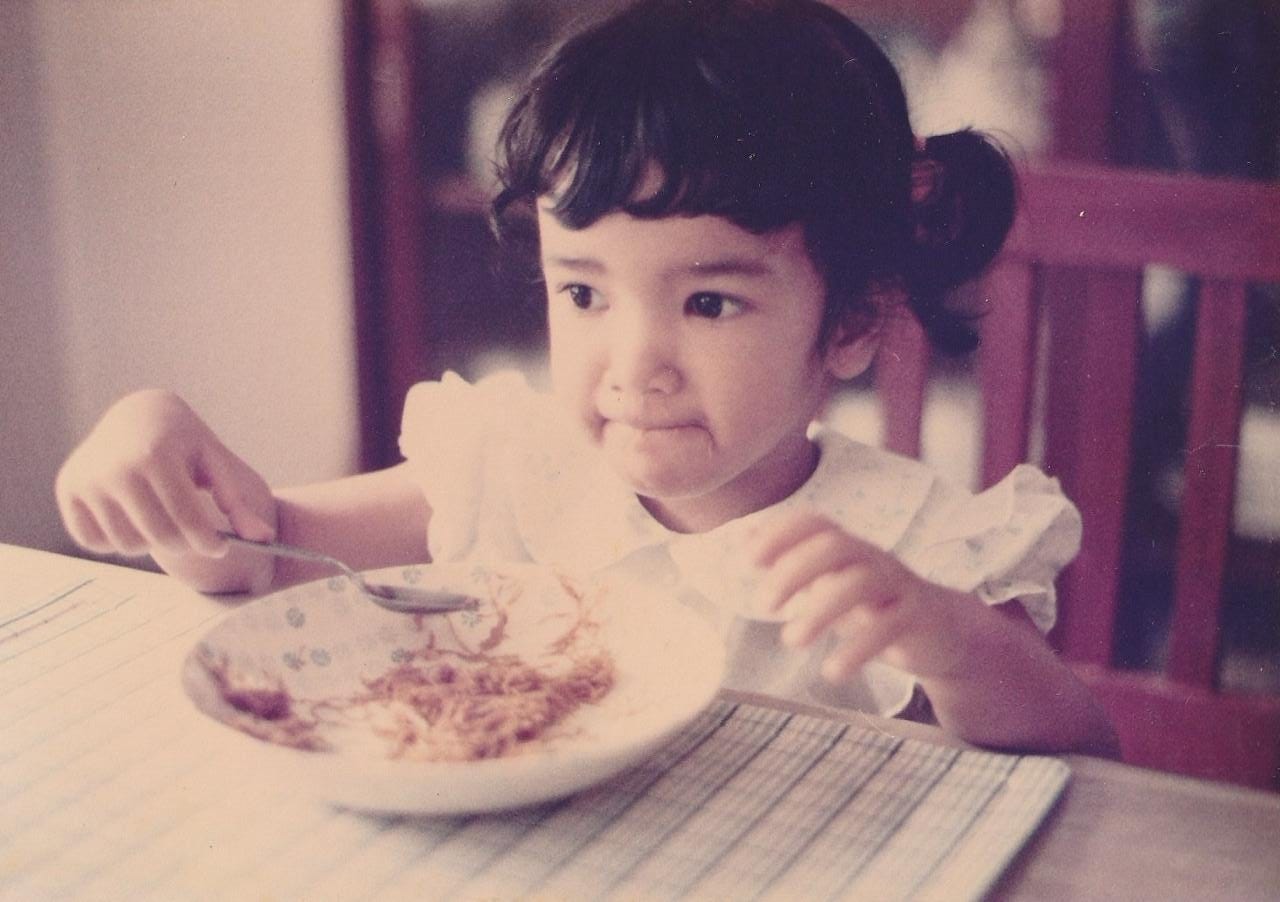
OTTO: How has your narrative around food changed as you’ve aged?
ALI: Growing up, I used to read a lot. I wish I read more now. But simply, I have other interests. I used to read Enid Blyton. She’s an English children’s book author and she had a ton of short stories for kids. My mom would get one for me and I’d finish reading it in an hour, so I was always looking for something to read in the house. She had Betty Crocker cookbooks she brought home from the States. She would get issues of Good Housekeeping and Ladies Home Journal. I’d flip to the recipe section of those.
I was always drawn to cookbooks and the food section of magazines because it was a very quick way to get an insight into how someone else lived. I’m reading this Betty Crocker cookbook as a Malaysian child in the 90s and thinking, This must be how Americans in the 70s ate — meatloaf and jellied salads.
Since I already had this is a window into how someone else eats and lives, that interest just got deeper as I grew older. What someone eats and consumes is a window into their lives, what surrounds it, where they are, what they are able to afford, what they are able to cook and eat. Stuff like that is really fascinating for me.
OTTO: What are the personal variables in your life that most profoundly impact your relationship with food?
ALI: I moved out of my parents house when I was about 27 or 28. I lived with my parents all the way up until I got married. When I got married and moved out, it was the first time I had my own kitchen.
Food has always been a way of trying to assert my own identity, assert my own space. When you live with other people, when I was living with my parents and brothers for example, not everything in the fridge would be for me. And that’s fine, but it also made me think, I wonder what it would look like if this was all mine. That was one of the things I dove into when I moved out of the house for the first time. I was like, “This is how I’m going to stock my kitchen, and do this, etc.” How do I want to curate my identity? That kind of thing. Because it was so tied to food.
I’ve since gotten a divorce and become a little bit more relaxed about it now. For example, I have pickles in my fridge. Am I a huge fan of pickles? No, but my friend likes them so all right. But for that brief period of time when I had just moved out, I was very possessive about the space and said, No, this must only be my stuff.
As for identity, there is also a mental health aspect. There were a lot of days in the past decade or so — it’s better now — where it was really hard for me to get out of bed. Thank goodness that takeout food is cheap in Malaysia but I also had muscle memory of being able to cook, so I could go on autopilot and put some things in a pot and call it soup. I fed myself, congratulations, and would go back to bed.
Food is also a huge part of care, not for other people but for myself too. Even when I really, truly have no appetite to eat, I will try and stuff a cracker into my mouth. Even if it’s Doritos. Is it the best choice? No, but something is better than nothing. I will make sure I eat something. And when someone else is unwell, whether physically or mentally, I will make sure that they eat something. Sometimes, when you’re cranky, you’re just hungry.
It’s that stereotype of the Asian auntie where instead of saying hello, they ask, “Have you eaten?” We are a whole nation of people who say hello by asking, “Dah makan?” or “Have you eaten?” That’s really nice to me. “Have you nourished yourself?” Yes, I have. Thank you. But [then they’ll say], “Even if you have — too bad, I’m going to give you these fried bananas anyway.”
OTTO: Your Malaysian culture has really impacted the way you view and interact with food.
ALI: Absolutely. Malaysians unfortunately love eating more than they love food. They like going out and finding the best curry meat or whatever it is. But on average, they don’t particularly think in depth about where their food comes from, whether culturally or logistically. More and more are thinking about that, thank goodness. But it’s not the default to buy beef at a market and ask, “Which farm did this come from?” It’s not a conversation that is common at all.
I want to be and love to be that person who thinks holistically about food. I try my best to ask as many questions as possible about what I’m eating and draw lines in between. Especially because in Southeast Asia, we have such a huge convoluted history of colonialism and in these seemingly separate countries, you can trace dishes between countries. It fascinates me incredibly.
OTTO: Food is a lifelong relationship. What would you say to your younger self about that relationship?
ALI: I think I would tell my younger self that you don’t have to force yourself to like certain things. You’ll find a version you like someday. I always said [to myself] as a child, “Why don’t I like this? I want to like this!” How dare I say I like to eat and I like food but I don’t like this?
One of the things that I didn’t like to eat growing up were peas. A lot of frozen peas tend to be chalky and I wasn’t a fan of it. I remember when I was 17, we went on a family vacation to the UK and we had fish and chips with minty, mushy peas and that was incredible. It was from that point on, I thought, I shouldn’t dismiss a whole [category] of food. I just haven’t met it in its ideal form yet.
That would be what I would tell my younger self: You’ll find the version you like. It’s not going to be tomorrow, but you’re going to have these mushy peas when you’re 17 and they’re going to be so good.
OTTO: Now that we’ve spent time talking about the past and the present, what do you hope for the future as it relates to food?
ALI: I’ve got some very fun, exciting projects in the pipeline. I am leaving Peruik, the Malaysian food website that I helped co-found. I have other projects I want to dip my toes into and want to have a bit more time to concentrate on those things. I mentioned earlier being in Southeast Asia and looking for connections between different dishes in different countries, so I’m looking to set up a newsletter maybe exploring those connections.
For example, there’s this sour soup in the northeast of peninsula Malaysia called singgang that shares a lot of flavor similarities with Filipino sinigang. The names and flavors are too similar for them to be completely separate things. I would like to see if I can trace a line between these dishes.
Before the colonizers came to Southeast Asia and divided up the land, we were all moving around — organically migrating, organically making connections, organically intermarrying. It’s borders, man. I have a lot to say about colonization, but that’s a different story. It also relates to food, is what I’m trying to say. I’m looking forward to that project.
I’m also looking to do documentation work. We have a lot of indigenous groups within Malaysia and because of logging, a lot of them are losing their food source. I would like to do this documentation project as much as possible while the elders are still alive, while there is still some forest to refer to.
There’s a lot of stuff I want to learn about this specific place that I’m in. A lot of people, including myself when I was younger, want to travel to eat. I still do, but there is so much here that is incredibly interesting. I want to learn about this place. I want to learn about this land and all the people who were here before me, my neighbors. That’s what I want to focus on over the next many years. I turn 40 in a few months and I’m very excited for my 40s.
Note: This interview has been edited for length and clarity.
Singgang
Recipe by Alia Ali
Originally published on Peruik
Makes 4 servings.
Ingredients:
½ large yellow onion, peeled and sliced into rings
3 cloves garlic, peeled and smashed
1″ ginger, peeled and thinly sliced
1″ fresh turmeric, peeled and thinly sliced
3 pieces asam keping
1 stalk lemongrass, bottom white part only, bruised
6 small, oily fish, such as kembung or selar kuning, gutted and cleaned
Salt to taste
Directions:
Add all ingredients to a medium-sized pot. Cover with about an inch of water, and place the filled pot on a medium-low flame. The fish will be cooked through when the soup has come to a simmer, about 5 minutes. Taste for salt, adding more if necessary. Turn off the flame and serve with hot white rice.
Tips:
You can use larger cuts of fish like tenggiri if you’d like, just note that it will take 1-2 minutes longer to cook compared with small, whole fish.
How has food shaped who you are? Share your story to be featured in an upcoming edition of Portrait of a Palate.
Thank you for being here. If you enjoyed this interview, please consider giving it a ♥️ or share with someone you love. Your support helps sustain my work.






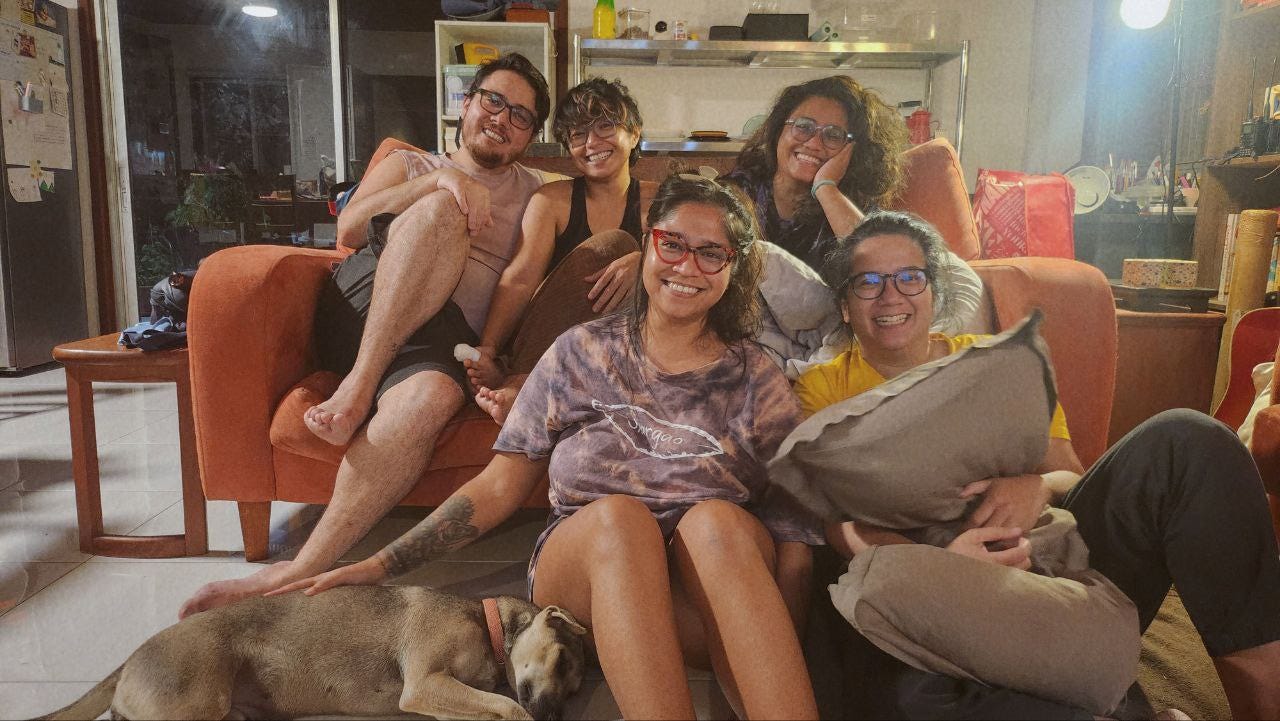

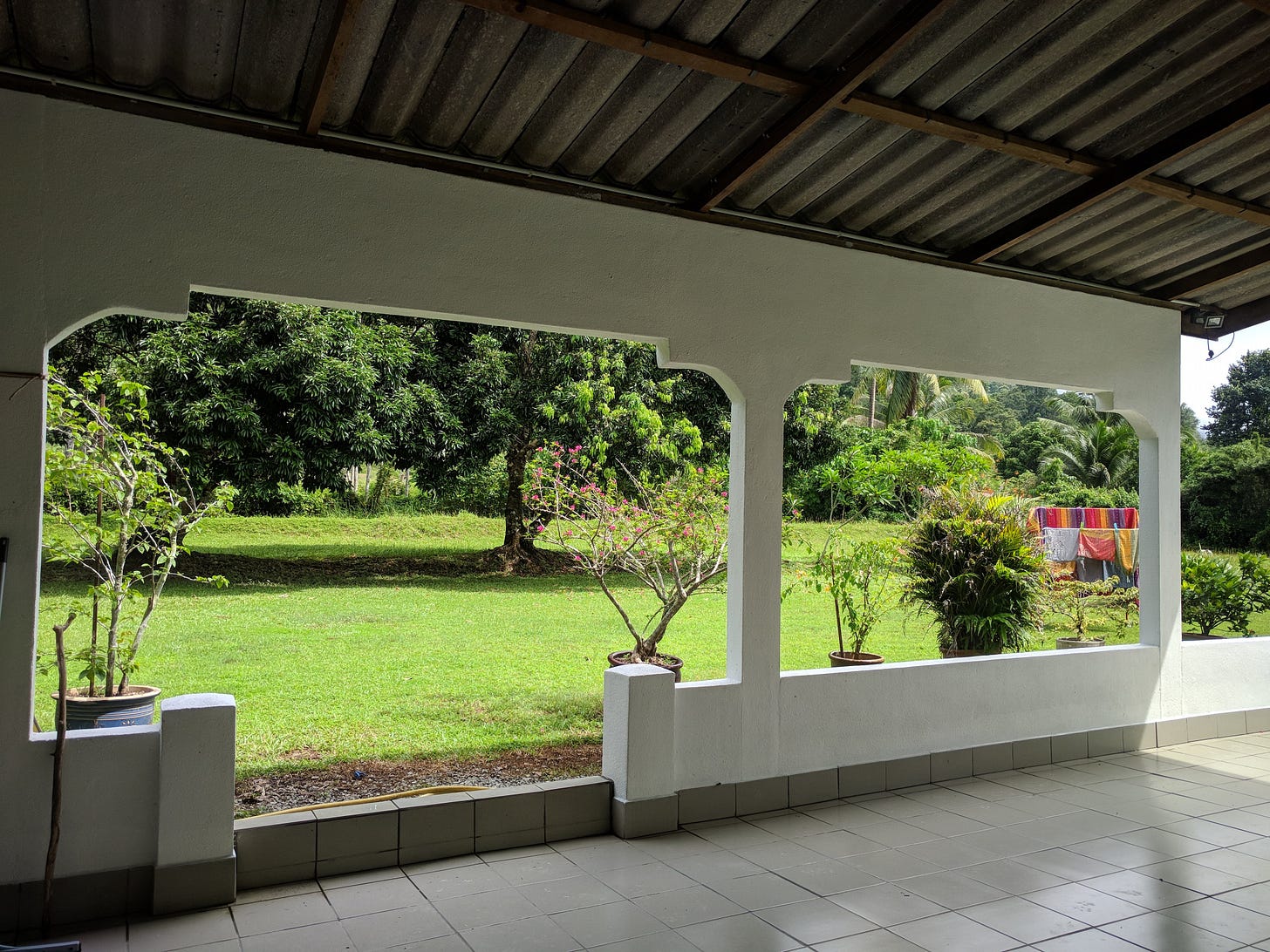


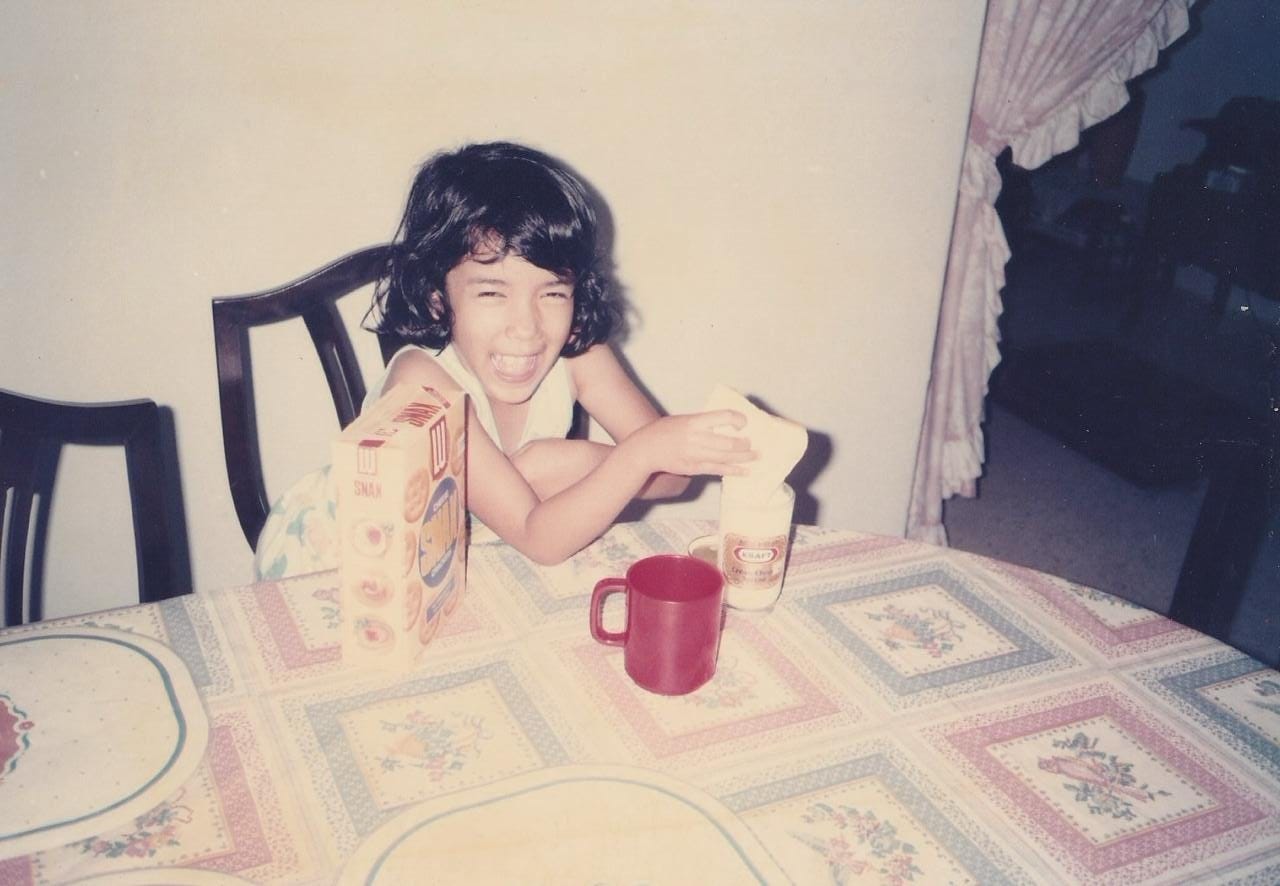
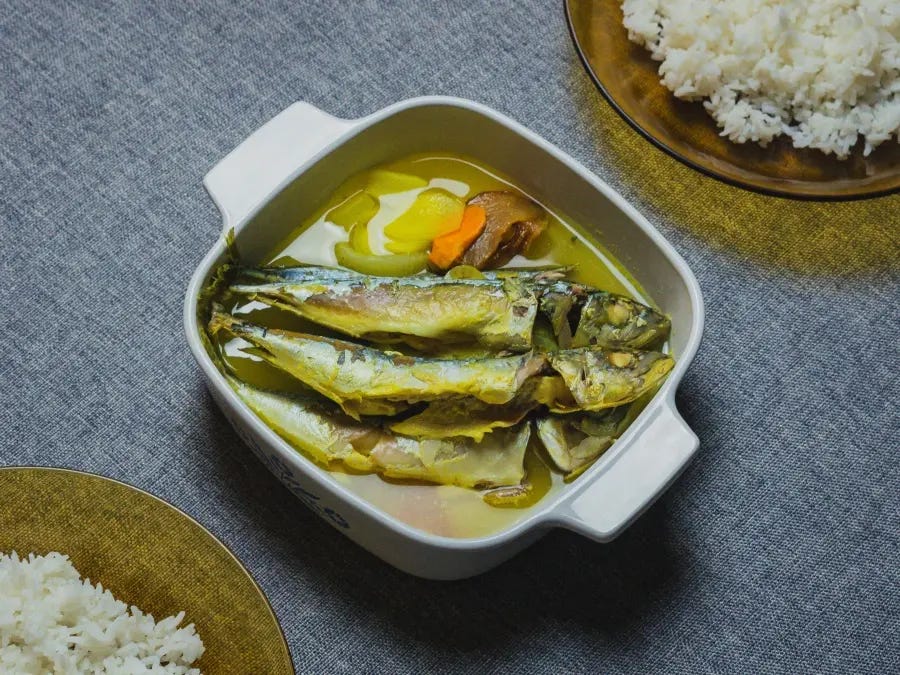
LOVED this one!